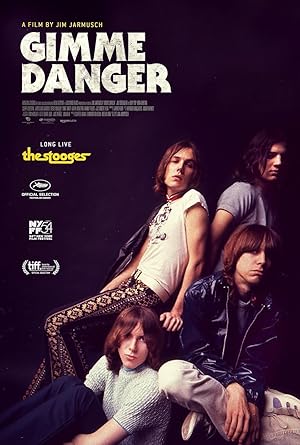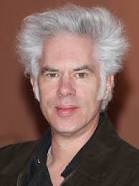
Gimme Danger Page #2
were built-in.
I had a little bedroom.
It was maybe, four or five feet wide
by about nine feet long.
There's room for a little palette
and a little mini desk.
So, the only place
I could set up my drums
was in the living room.
All weekend long
my, my drum set took up
the entire living room.
I had a lot of energy,
I'd beat for hours.
Beat, bam, bam, bam, and I'm..
[imitating percussion music]
The whole place is shakin'.
[music continues]
They never complained
but what they finally did do
was after about a year of that
they just gave me the master bedroom.
[laughing]
At the time I thought,
"Wow, this is great!"
but now I realize,
also it was probably a..
Probably a comparable lesser
of two tortures.
And they moved a..
They-they moved
a standard sized bed
into the small room.
No desk,
just-just enough so they could
get in and out of bed.
And I had a...
...single bed and my drum set
set up all the time
in the master bedroom.
I was so lucky...
...to live at close quarters
in a simple environment with my parents.
I got to know my parents.
Uh, that's a..
That's a real treasure.
[instrumental music]
I remember dumping my Tinker toys
and my Lincoln Logs
when I was a little boy
and pickin' up the wood bits.
And I would make a drum out
of the cylinder and beat on it.
And then, when I was in the fourth grade
they took us to
the River Rouge assembly plant
of the Ford Motor Company.
And they had a machine that engineered
a controlled drop of a piece of metal
onto a stamping plate.
the stamping plate
it made... this racket, this..
[imitates banging]
A-a-a mega-clang.
And, uh,
I-I liked the mega-clang.
[instrumental music]
I walk today
Past some old time
(Iggy) I had a high school
band, "The Iguanas."
We got a job playin' full-time
at a teen club.
A place called The Ponytail.
I kept scheming, thinking of things
to get more attention and,
uh, so I thought
"What if I played
on the biggest drum riser
that anybody has ever had?"
I was about 16 feet up.
[chuckling]
All by myself, you know
and the, and the band
is down there grumbling.
A loser in the biz named Chuck
approached me and he said
"Well, I think you guys are pretty good
"I'd like to be your manager
and I'll help you
promote your own gigs."
So we rented a pier for one night
to throw our own concert.
And we had a huge turnout,
a huge success.
[instrumental music]
Until half-way through
the floor started to give.
[screaming]
Nobody got hurt but basically,
we, we broke the pier.
[Iggy chuckling]
That was the end of the self promotion.
I was "The Iguanas" during high school
and straight out of high school
then a semester in college.
Then I dropped out of college
and was looking out for
somebody to give me a job.
And the "Prime Movers"
were these school dropout
older guys.
And they knew
about all sorts of blues music.
Butterfield's band came through town
and the "Prime Movers"
tried to establish a connection
to see if our group could get
some work through them.
I asked, uh, Jerome Arnold
the bass player
in Butterfield at the time
if he had any tips for me and my playing
and he said, "When you play,
you play it like you mean it."
I was getting fairly good
and, um, at some point I lost
respect for or faith in the group.
And I thought it wasn't really itself.
So I decided to go where the real..
[chuckles] ...real people
were doing the real deal.
[instrumental music]
Different.
Not like white America.
I sat in with a couple of guys
and, uh, actually got paid
to do very unimportant gigs.
Once with a guy named Johnny Young
and once with Big Walter Horton
when they had to go out
and play for white people.
And, uh, and it was a thrill
for me and I learned a lot.
[music continues]
It was more relaxed.
They knew how to have a good time.
And the music
was... very definite.
I saw a little glimpse
of a deeper life of people
who in their adulthood
had not lost their childhood.
[music continues]
I smoked a big joint
one day by the river
and realized that I was not black.
for our generation
what the good black players
that I loved were doing for theirs.
[music continues]
Eventually, I just got tired of looking
at somebody's butt all the time.
[chuckling]
That's your-that's,
that's your curse.
The best butt I ever played
the two best butts I ever played behind
were Abdul Fakir,
in "The Four Tops."
He was the Four Top that would unify
the other in their,
in their dance steps.
He was, he was like
a ba-large bird.
And the other one was Mary Weiss
from "The Shangri-Las."
Wonderful body and face.
Delicious, creamy, female dream thing.
He don't hang around
With the gang no more
I realized drumming
wasn't what I wanted to do
so I decided to go back to Ann Arbor
but I needed a ride home.
So I called Ron
and somehow Scott Richardson had a car
and, uh, I did talk Ron
into working with me.
'Cause I know that he did it for me
Can't you see And I can see
It's still in the streets
His heart is out in the street
[instrumental music]
Ron Asheton was a musician.
He was one of the few people
that had longer hair than me.
He was playing bass
occasionally with a band
called "The Chosen Few"
and I really like his style on bass.
I met his brother, Scott, later
when I was working at Discount Records.
Across the street, there was a drugstore
called Marshall's.
And Scott and a couple of guys
hung out inside this drugstore
doing nothing.
One young tough and his friends.
Now Scott looked like Elvis.
Good-looking, athletic-looking
indirect, uncommunicative kid.
Scott left school after the ninth grade.
to somebody and that was that.
He immediately began pestering me
something on the drums.
I would ask you
do you double stroke on your triplets?
Mm-hmm.
You know, I would think up
things to ask you...
- Oh, I see.. Get it going.
- Just, just to talk to you.
(Iggy) So I taught him,
like, four or five beats.
Mostly, uh, Stax, Volt
and Bo Diddley stuff.
(Scott) My name is Scotty Asheton.
I go to Garfield School.
I'm eight and a half years old.
(Ron)
Hmm! My name is Ronny Asheton.
I'm nine years old.
My.. I go to Garfield school.
(Iggy) They lost their dad when,
uh, I-I think Ron was 14.
And their father had been
a fighter pilot in the war
and stayed in the military
shortly after the war
was something we all had in common.
(Ron)
...two, one, zero, dive!
[Ron imitating siren wailing]
My dad was a World War II veteran.
On his travels, he would buy
a little something
like a dagger or a medal.
And then I got interested in it.
And we started collecting.
And that was like a father and son..
We found something to bond with.
It had nothing to do with politics
Translation
Translate and read this script in other languages:
Select another language:
- - Select -
- 简体中文 (Chinese - Simplified)
- 繁體中文 (Chinese - Traditional)
- Español (Spanish)
- Esperanto (Esperanto)
- 日本語 (Japanese)
- Português (Portuguese)
- Deutsch (German)
- العربية (Arabic)
- Français (French)
- Русский (Russian)
- ಕನ್ನಡ (Kannada)
- 한국어 (Korean)
- עברית (Hebrew)
- Gaeilge (Irish)
- Українська (Ukrainian)
- اردو (Urdu)
- Magyar (Hungarian)
- मानक हिन्दी (Hindi)
- Indonesia (Indonesian)
- Italiano (Italian)
- தமிழ் (Tamil)
- Türkçe (Turkish)
- తెలుగు (Telugu)
- ภาษาไทย (Thai)
- Tiếng Việt (Vietnamese)
- Čeština (Czech)
- Polski (Polish)
- Bahasa Indonesia (Indonesian)
- Românește (Romanian)
- Nederlands (Dutch)
- Ελληνικά (Greek)
- Latinum (Latin)
- Svenska (Swedish)
- Dansk (Danish)
- Suomi (Finnish)
- فارسی (Persian)
- ייִדיש (Yiddish)
- հայերեն (Armenian)
- Norsk (Norwegian)
- English (English)
Citation
Use the citation below to add this screenplay to your bibliography:
Style:MLAChicagoAPA
"Gimme Danger" Scripts.com. STANDS4 LLC, 2025. Web. 22 Feb. 2025. <https://www.scripts.com/script/gimme_danger_8967>.







Discuss this script with the community:
Report Comment
We're doing our best to make sure our content is useful, accurate and safe.
If by any chance you spot an inappropriate comment while navigating through our website please use this form to let us know, and we'll take care of it shortly.
Attachment
You need to be logged in to favorite.
Log In